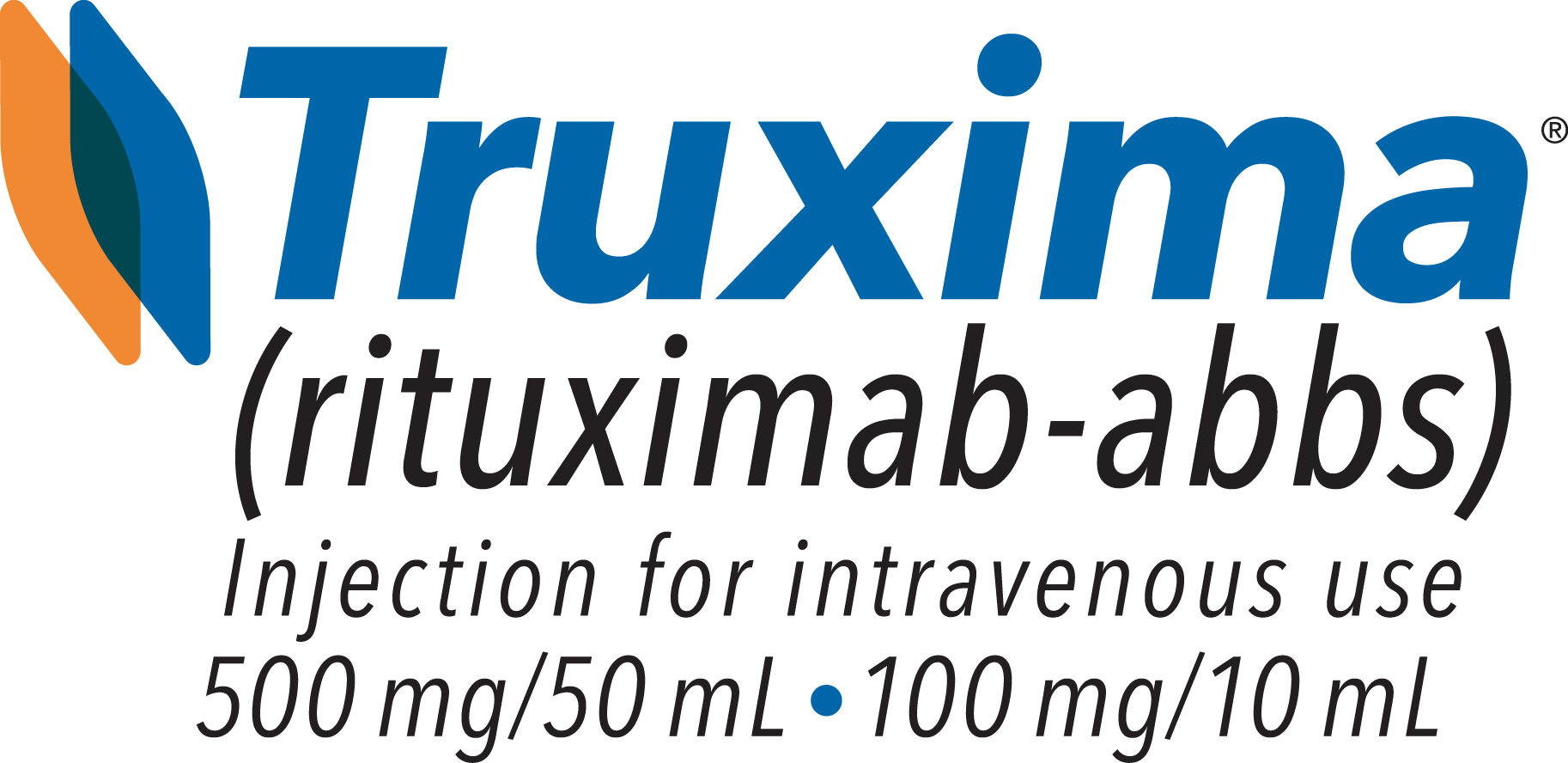APPROVED USE
TRUXIMA is a prescription medicine used to treat adults with:
- Non-Hodgkin's Lymphoma (NHL): alone or with other chemotherapy medicines
- Chronic Lymphocytic Leukemia (CLL): with the chemotherapy medicines fludarabine and cyclophosphamide
- Rheumatoid Arthritis (RA): with another prescription medicine called methotrexate, to reduce the signs and symptoms of moderate to severe active RA, after treatment with at least one other medicine called a tumor necrosis factor (TNF) antagonist has been used and did not work well
- Granulomatosis with Polyangiitis (GPA) (Wegener’s Granulomatosis) and Microscopic Polyangiitis (MPA): with glucocorticoids, to treat GPA and MPA
- TRUXIMA is not indicated for treatment of children.
IMPORTANT SAFETY INFORMATION
TRUXIMA can cause serious side effects that can lead to death, including:
- Infusion-related reactions. Infusion-related reactions are very common side effects of TRUXIMA treatment. Serious infusion-related reactions can happen during your infusion or within 24 hours after your infusion of TRUXIMA. Your healthcare provider should give you medicines before your infusion of TRUXIMA to decrease your chance of having a severe infusion-related reaction.
Tell your healthcare provider or get medical help right away if you get any of these symptoms during or after an infusion of TRUXIMA:
- hives (red itchy welts) or rash
- shortness of breath, difficulty breathing, or wheezing
- itching
- weakness
- swelling of your lips, tongue, throat, or face
- dizziness or feel faint
- sudden cough
- palpitations (feel like your heart is racing or fluttering)
- chest pain
- Severe skin and mouth reactions. Tell your healthcare provider or get medical help right away if you get any of these symptoms at any time during your treatment with TRUXIMA:
- painful sores or ulcers on your skin, lips, or in your mouth
- blisters
- peeling skin
- rash
- pustules
- Hepatitis B virus (HBV) reactivation. Before you receive your TRUXIMA treatment, your healthcare provider will do blood tests to check for HBV infection. If you have had hepatitis B or are a carrier of hepatitis B virus, receiving TRUXIMA could cause the virus to become an active infection again. Hepatitis B reactivation may cause serious liver problems including liver failure, and death. You should not receive TRUXIMA if you have active hepatitis B liver disease. Your healthcare provider will monitor you for hepatitis B infection during and for several months after you stop receiving TRUXIMA.
Tell your healthcare provider right away if you get worsening tiredness, or yellowing of your skin or white part of your eyes, during treatment with TRUXIMA.
- Progressive Multifocal Leukoencephalopathy (PML). PML is a rare, serious brain infection caused by a virus that can happen in people who receive TRUXIMA. People with weakened immune systems can get PML. PML can result in death or severe disability. There is no known treatment, prevention, or cure for PML.
Tell your healthcare provider right away if you have any new or worsening symptoms or if anyone close to you notices these symptoms:
- confusion
- decreased strength or weakness on one side of your body
- dizziness or loss of balance
- vision problems
- difficulty walking or talking
Before you receive TRUXIMA, tell your healthcare provider about all of your medical conditions, including if you:
- have had a severe reaction to TRUXIMA or a rituximab product
- have a history of heart problems, irregular heart beat, or chest pain
- have lung or kidney problems
- have an infection or weakened immune system
- have or have had any severe infections including:
- Hepatitis B virus (HBV)
- Hepatitis C virus (HCV)
- Cytomegalovirus (CMV)
- Herpes simplex virus (HSV)
- Parvovirus B19
- Varicella zoster virus (chickenpox or shingles)
- West Nile virus
- have had a recent vaccination or are scheduled to receive vaccinations. You should not receive certain vaccines before or during treatment with TRUXIMA
- are pregnant or plan to become pregnant. Talk to your healthcare provider about the risks to your unborn baby if you receive TRUXIMA during pregnancy
Females who are able to become pregnant:
- Your healthcare provider should do a pregnancy test to see if you are pregnant before starting TRUXIMA
- You should use effective birth control (contraception) during treatment with TRUXIMA and for 12 months after your last dose of TRUXIMA. Talk to your healthcare provider about effective birth control.
- Tell your healthcare provider right away if you become pregnant or think that you are pregnant during treatment with TRUXIMA
- are breastfeeding or plan to breastfeed. TRUXIMA may pass into your breast milk. Do not breastfeed during treatment and for 6 months after your last dose of TRUXIMA
Tell your healthcare provider about all the medicines you take, including prescription and over-the-counter medicines, vitamins, and herbal supplements. Especially tell your doctor if you take or have taken:
- a TNF inhibitor medicine
- a Disease Modifying Anti-Rheumatic Drug (DMARD)
If you are not sure if your medicine is one listed above, ask your healthcare provider.
TRUXIMA can cause serious side effects, including:
- Tumor Lysis Syndrome (TLS). TLS is caused by the fast breakdown of cancer cells. TLS can cause you to have:
- kidney failure and the need for dialysis treatment
- abnormal heart rhythm
TLS can happen within 12 to 24 hours after an infusion of TRUXIMA. Your healthcare provider may do blood tests to check you for TLS. Your healthcare provider may give you medicine to help prevent TLS.
Tell your healthcare provider right away if you have any of the following signs or symptoms for TLS:
- nausea
- vomiting
- diarrhea
- lack of energy
- Serious infections. Serious infections can happen during and after treatment with TRUXIMA, and can lead to death. TRUXIMA can increase your risk of getting infections and can lower the ability of your immune system to fight infections. Types of serious infections that can happen with TRUXIMA include bacterial, fungal, and viral infections. After receiving TRUXIMA, some people have developed low levels of certain antibodies in their blood for a long period of time (longer than 11 months). Some of these people with low antibody levels developed infections. People with serious infections should not receive TRUXIMA. Tell your healthcare provider right away if you have any symptoms of infection:
- fever
- cold symptoms, such as runny nose or sore throat that do not go away
- flu symptoms, such as cough, tiredness, and body aches
- earache or headache
- pain during urination
- cold sores in the mouth or throat
- cuts, scrapes, or incisions that are red, warm, swollen, or painful
- Heart problems. TRUXIMA may cause chest pain, irregular heartbeats, and heart attack. Your healthcare provider may monitor your heart during and after treatment with TRUXIMA if you have symptoms of heart problems or have a history of heart problems. Tell your healthcare provider right away if you have chest pain or irregular heartbeats during treatment with TRUXIMA.
- Kidney problems, especially if you are receiving TRUXIMA for NHL. TRUXIMA can cause severe kidney problems that lead to death. Your healthcare provider should do blood tests to check how well your kidneys are working.
- Stomach and serious bowel problems that can sometimes lead to death. Bowel problems, including blockage or tears in the bowel, can happen if you receive TRUXIMA with chemotherapy medicines. Tell your healthcare provider right away if you have any severe stomach-area (abdomen) pain or repeated vomiting during treatment with TRUXIMA.
Your healthcare provider will stop treatment with TRUXIMA if you have severe, serious, or life-threatening side effects.
The most common side effects of TRUXIMA include:
- infusion-related reactions
- infections (may include fever, chills)
- body aches
- tiredness
- nausea
The most common side effects of TRUXIMA in adults with GPA or MPA include:
- low white and red blood cells
- swelling
- diarrhea
- muscle spasms
Other side effects with TRUXIMA include:
- aching joints during or within hours of receiving an infusion
- more frequent upper respiratory tract infection
These are not all of the possible side effects with TRUXIMA.
Please see the TRUXIMA full Prescribing Information, including Boxed Warning and Medication Guide.
Call your doctor for medical advice about side effects.
You may report side effects to FDA at 1-800-FDA-1088. You may also report side effects to Teva at 1-888-483-8279.






